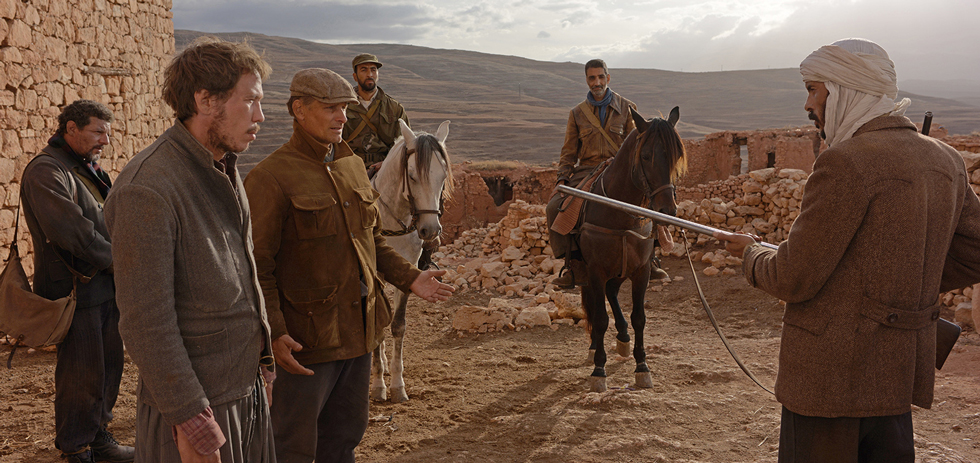
The schoolteacher takes another drag on his cigarette and smoke wafts throughout the house, it hits the light and clarity disappears, a figure sitting in another room is caught in a diffused glow, we can’t him make out now but we know what he looked like before, his past self passed off as his present in our short-term memory. Smoke and the dust of rubble are regular features in David Oelhoffen’s Far From Men (Loin des hommes), providing a sharp contrast from the barren Algerian landscape, as if to show us that truth, loyalty and self-delusion are all man-made, imposing themselves on the serenity of nature.
Based on Albert Camus’ short story The Guest, the film focuses on a moral quandry faced by Daru (Viggo Mortensen), an army veteran turned schoolteacher, after Mohamed (played by Reda Kateb), an “Arab” murder suspect, is placed under his care. His orders are to take the man to his trial (and presumed death sentence) in Tinguit, a day’s journey away, but he balks at the idea early on; as we discover more about the paths of both men, we start to understand why, Oelhoffen probing into the laws of man, and the extent to which individuals should follow them.
Much of the film is spent following Daru and Mohamed as they traverse the Algerian mountainside, thankfully Oelhoffen moves beyond a French retread of Gus van Sant’s Gerry when the narrative minimalism takes on an air of urgency after the pair find themselves caught in the Algerian Revolution of 1954. It’s a more serious take on a narrative device from Leone’s The Good, The Bad and The Ugly, when the spoils of plot are suddenly stymied by war, the dark realisation of conflict and ideology beyond that of our characters.
Viggo Mortensen has a habit of placing characters defined by their duality; in his Cronenberg double (A History of Violence and Eastern Promises) he grappled with hidden pasts and self-deception, and Far From Men continues much of this thematic exploration. The details of his past trickle out slowly; whilst we are given a clever reveal into Mohamed’s motivations midway through the film, Daru’s past is harder to ascertain, the definitive account of his allegience only coming at the film’s end.
That said, character construction isn’t the only trend in Mortensen’s filmography replicated here. The sight of him walking across a barren landscape in a non-English language film seems a clear echo of his recent work in Lisandro Alonso’s Jauja. Unlike that film, though, Far From Men doesn’t boast much in the way of visual wonder. There are some goregous landscape shots, a given, but the cinematography and editing seem pedestrian, though they aim for restraint. Oelhoffen and cinematographer Guillaume Deffontaines seem caught between truly minimalist cinematography — as in the film’s opening deep-focus wide shot, where running schoolchildren appear the size of ants in the distance — and some handheld camerawork that runs the gamut from thrilling (reacting to a nearby explosion) to amateurish (replicating their POV as they stumble on a steep hell). Whilst the near theatrical lighting inside Daru’s house early on in the film seems to suggest a sense of disconnect from realism, the fact that this visual concept is never built upon is disappointing.
Its visual conventionality is balanced out by the nuanced performances of both Mortensen and Kateb, which effectively complement the seemingly simple screenplay. Much like the mostly minimal score by Nick Cave and Warren Ellis (who also scored The Road, another Mortensen feature), Oelhoffen’s script works with familiar elements – one of which is Daru as white saviour — but undercuts the trope by having the film’s structure rest not on his individual heroism or morality but on the idea of fate and imprisonment. The movement of both Daru and Mohamed through the Revolution, as prisoners, hostages or the liberated, sees the circumstances of the times they live in overpower the semblence of their character.
